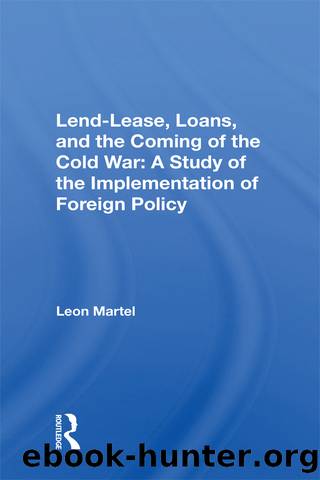Lend-lease, Loans, And The Coming Of The Cold War by Leon C Martel

Author:Leon C Martel [Martel, Leon C]
Language: eng
Format: epub
Tags: History, General
ISBN: 9780429727399
Google: SKubDwAAQBAJ
Publisher: Routledge
Published: 2019-04-11T01:35:08+00:00
President Truman's directive of May 11 had set forth the policy to be followed by those in charge of Soviet aid, but it had not resolved problems of interpretation nor did it settle difficulties that continued to arise because of the lack of overall direction that plagued the entire lend-lease program. The initial result of the meetings held immediately following the president's directive had been a clarification that permitted lend-lease to go forward to the Soviet Union primarily from the West Coast in support of programs strengthening Russian forces for their eventual participation in the war against Japan. These programs included: Annex III (the MILEPOST list approved the previous November); a program to support the northern air route from Alaska through eastern Russia and Siberia; the annual summer program for the Soviet Arctic; and the maintenance of other items of equipment previously shipped. Any Soviet needs beyond these programs were to be considered in two categories. The first consisted of military requirements (exclusively for the Pacific war) for lend-lease supplies after July 1, 1945. The Russians had been told in Grew's note of May 12 to Charge Novikov to submit a statement of such requirements as soon as possible and to furnish along with it adequate information justifying their need. The second category consisted of industrial plants on which only "proportionally small deliveries" had been made and other equipment and supplies that had been ordered but could not be delivered under the principles set forth in the president's May 11 directive. The Russians had been informed earlier that these items could be purchased on a cash payment basis for their contract price plus 15 percent to cover transportation, storage, and accessorial charges.53
It was while the Russians were considering their response to these newly announced policies that Harry Hopkins was in Moscow at the request of President Truman to try to break the impasse that had developed over the question of the formation of the Polish government as well as to discuss with Soviet leaders several other matters troubling Russian-American relations; and it was on that occasion that he had faced Stalin's vigorous criticism of the "scornful and abrupt manner" in which lend-lease to Russia had been curtailed. Hopkins had replied to the Soviet leader that the precipitous manner in which lend-lease to Russia had been cut back was the result of a "technical misunderstanding" that had been promptly rectified. Nevertheless, he had explained, the end of the war with Germany necessitated a reconsideration of the lend-lease program, and he assumed that this had been clear to the Russians. Hopkins then sought to reassure the Soviet leader that the curtailment of lend-lease was strictly a legal action that "did not have any fundamental policy significance" and that it was not intended as a "pressure weapon," and, as added assurance of America's intention to assist the Soviet Union, he pointed out that the United States had accepted in full a commitment to deliver supplies for use in the Far East and that it was in the process of carrying out this obligation.
Download
This site does not store any files on its server. We only index and link to content provided by other sites. Please contact the content providers to delete copyright contents if any and email us, we'll remove relevant links or contents immediately.
| Arms Control | Diplomacy |
| Security | Trades & Tariffs |
| Treaties | African |
| Asian | Australian & Oceanian |
| Canadian | Caribbean & Latin American |
| European | Middle Eastern |
| Russian & Former Soviet Union |
The Secret History by Donna Tartt(19047)
The Social Justice Warrior Handbook by Lisa De Pasquale(12186)
Thirteen Reasons Why by Jay Asher(8892)
This Is How You Lose Her by Junot Diaz(6875)
Weapons of Math Destruction by Cathy O'Neil(6264)
Zero to One by Peter Thiel(5786)
Beartown by Fredrik Backman(5737)
The Myth of the Strong Leader by Archie Brown(5496)
The Fire Next Time by James Baldwin(5431)
How Democracies Die by Steven Levitsky & Daniel Ziblatt(5213)
Promise Me, Dad by Joe Biden(5141)
Stone's Rules by Roger Stone(5080)
A Higher Loyalty: Truth, Lies, and Leadership by James Comey(4950)
100 Deadly Skills by Clint Emerson(4919)
Rise and Kill First by Ronen Bergman(4778)
Secrecy World by Jake Bernstein(4740)
The David Icke Guide to the Global Conspiracy (and how to end it) by David Icke(4699)
The Farm by Tom Rob Smith(4502)
The Doomsday Machine by Daniel Ellsberg(4484)
